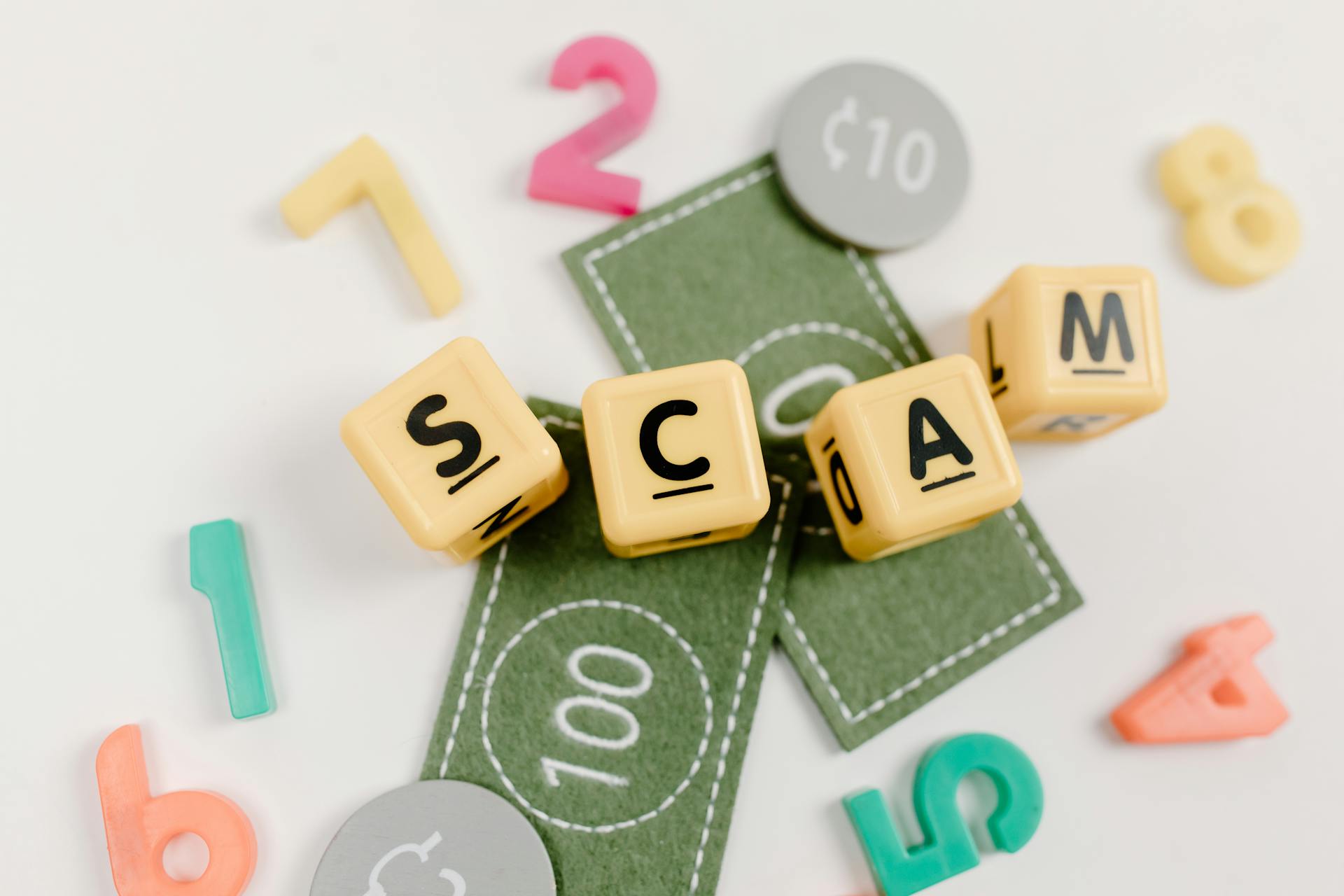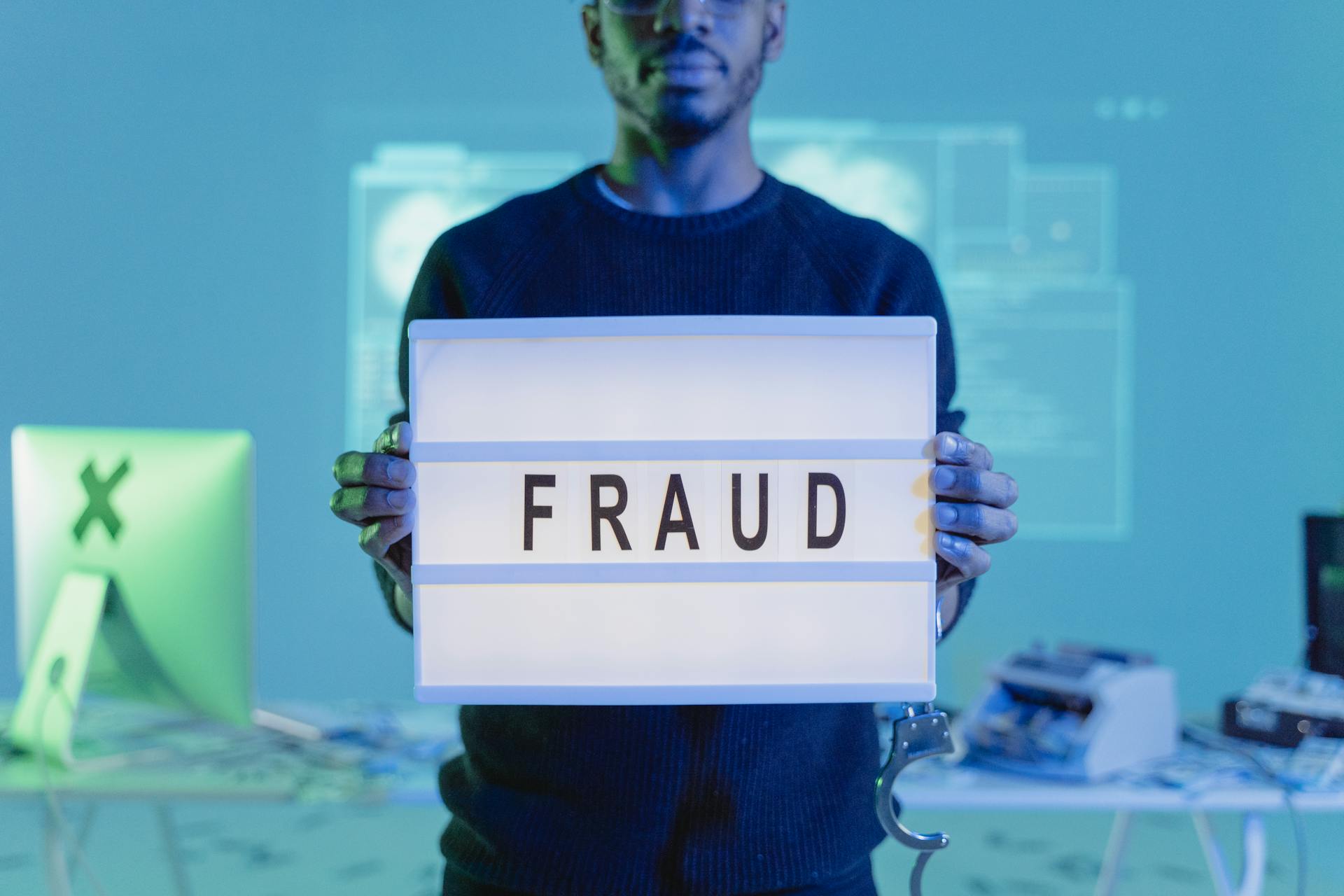
Scammers are targeting small businesses with fake PPP loan calls, trying to steal sensitive information and money.
These calls often claim to be from the SBA or a lender, but they're not. In fact, the SBA has warned of these scams, urging businesses to be cautious.
Be on the lookout for calls that demand immediate action or payment, as these are common tactics used by scammers.
If you're unsure about a call, hang up and verify the information through the SBA's official website or by contacting your lender directly.
On a similar theme: Disaster Business Loan Application
Scam Prevention
Be cautious of unsolicited calls or emails claiming to be from the SBA or other government agencies regarding your PPP loan. These may be scams designed to trick you into providing personal or financial information.
Scammers often use official-looking documents, such as fake court orders or subpoenas, to create a sense of legitimacy. They may also threaten legal action or jail time if you don't comply with their demands.
To avoid falling victim to these scams, carefully review the payment details. Scammers often ask for payments via gift cards, wire transfers, or cryptocurrencies, which are difficult to trace.
Legitimate authorities will not pressure you to take immediate action without giving you the opportunity to verify the situation. If the caller or email demands immediate payment or personal information, be suspicious.
Always verify the contact information provided in the communication. Scammers may use phone numbers or email addresses that appear similar to those of legitimate institutions but have slight alterations.
Report suspicious activity to your local law enforcement, the FBI, or the Federal Trade Commission (FTC). This helps authorities track down and stop scammers.
Here are some red flags to watch out for:
- Unsolicited contact from someone claiming to be from the SBA or other government agencies
- Threatening language or demands for immediate payment
- Official-looking documents that appear to be fake
- Requests for personal or financial information
- Pressure to act quickly without verifying the legitimacy of the claim
If you're unsure about the authenticity of a communication, don't hesitate to reach out to the relevant authorities directly using verified contact details.
Scam Nature and Indicators
Scammers often pose as government officials, court staff, or law enforcement officers, contacting individuals or businesses via telephone or email under the pretense of unresolved issues related to PPP loans.
They may claim that the recipient has failed to comply with certain requirements, such as attending a court hearing or submitting additional documentation. These fraudulent communications frequently include threats of severe consequences, such as arrest, fines, or legal action, if the recipient does not immediately respond or take the demanded action.
Scammers may use phone numbers or email addresses that appear similar to those of legitimate institutions but have slight alterations. They may also send fake documents that appear to be official court orders, subpoenas, or other legal notices.
Legitimate authorities will not pressure you to take immediate action without giving you the opportunity to verify the situation. If the caller or email demands immediate payment or personal information, be suspicious.
Here are some common signs of a scam:
- Unsolicited contact
- Threatening language
- Official-looking documents
- Request for immediate action
- Out-of-context communication
- A sense of urgency and pressure
If you receive a suspicious call or email, report it immediately to your local law enforcement, the FBI, or the Federal Trade Commission (FTC). This helps authorities track down and stop scammers.
Prevention and Protection
Be cautious of unsolicited calls or emails claiming missed court dates or urgent issues regarding your PPP loan. These are common tactics used by scammers to catch you off guard.
Scammers often use threatening language, claiming that you're in "contempt of court" or have violated a legal order related to your PPP loan. They may threaten immediate arrest or financial penalties if you don't comply.
Legitimate authorities will not pressure you to take immediate action without giving you the opportunity to verify the situation. If the caller or email demands immediate payment or personal information, be suspicious.
To protect yourself and your business, familiarize yourself with the signs of a scam. Be aware of unexpected contact, threatening language, requests for immediate payment, and impersonation.
Here are some common signs of a scam to watch out for:
- Unsolicited contact: Be cautious of unexpected calls or emails from individuals claiming to be government representatives.
- Threatening language: Scammers often use intimidating language, claiming that you're in "contempt of court" or have violated a legal order related to your PPP loan.
- Official-looking documents: Scammers may send fake documents that appear to be official court orders, subpoenas, or other legal notices.
- Request for immediate action: The victim is pressured to act quickly, often without time to verify the legitimacy of the claim.
- Out-of-context communication: Government agencies or courts do not typically communicate legal issues via phone calls or emails, especially not without prior notice.
- A sense of urgency and pressure: Legitimate authorities will not pressure you to take immediate action without giving you the opportunity to verify the situation.
If you receive a suspicious call or email, report it immediately to your local law enforcement, the FBI, or the Federal Trade Commission (FTC). This helps authorities track down and stop scammers.
Always verify the legitimacy of any communication related to your PPP loan. Contact the relevant authorities directly using verified contact details, not those provided in the suspicious communication.
Scam Alert
Be cautious of unsolicited calls or emails claiming missed court dates or urgent issues regarding your PPP loan.
Scammers may claim to be law enforcement or government officials, but authentic officials will not make such demands over a phone call or email.
Unexpected contact from someone claiming to be from the SBA is a common tactic used by scammers.
The SBA does not initiate contact to find out about you or your business or to offer loans.
Scammers often use intimidating language, claiming that the victim is in “contempt of court” or has violated a legal order related to their PPP loan.
Threatening language is a red flag, and you should not comply with demands for immediate payment.
Scammers may send fake documents that appear to be official court orders, subpoenas, or other legal notices.
Legitimate authorities will not pressure you to take immediate action without giving you the opportunity to verify the situation.
To avoid falling victim to PPP loan scams, be skeptical of unsolicited emails or calls from someone claiming to be from the SBA.
Don't give personal information like your Social Security or bank account number to someone who calls, emails or texts you out of the blue.
If you receive a suspicious call or email, report it immediately to your local law enforcement, the FBI, or the Federal Trade Commission (FTC).
Here are some common signs of a scam:
- Unsolicited contact
- Threatening language
- Official-looking documents
- Request for immediate action
- Out-of-context communication
- A sense of urgency and pressure
If you're unsure about the legitimacy of a communication, verify the information by contacting the relevant authorities directly using verified contact details.
Remember, it's always better to be safe than sorry, so don't hesitate to report suspicious activity and seek advice from a trusted source.
Frequently Asked Questions
Has anyone gone to jail for PPP?
Yes, individuals have been sentenced to prison for PPP fraud, including a Georgetown couple who received a combined 32 years in federal prison. Prison sentences for PPP-related crimes have been handed down in federal court.
Sources
- https://www.pvfcu.org/protect-against-ppp-loan-scams/
- https://abc11.com/ppp-loan-scam-paycheck-protection-program-covid-19/14554513/
- https://sbtdc.org/blog/protect-your-small-business-rising-wave-of-ppp-loan-fraud-targeting-business-owners
- https://members.ssvpusa.org/poverty-updates/ppp-loan-scam-alert/
- https://www.aarp.org/work/small-business/ppp-loans-scams-fraud/
Featured Images: pexels.com


